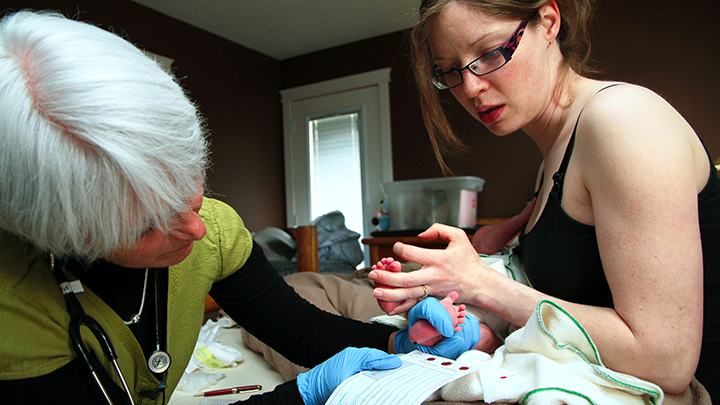
June 19, 2019

Patricia Lenstra collects a blood spot sample during a home visit while mother Christina Gierus looks on.
Story by Melissa Schock
As part of World Sickle Cell Day, June 19, Alberta Health Services (AHS) wants expectant and new parents to know that sickle cell disease testing is now available for all babies through Alberta’s Newborn Metabolic Screening (NMS) Program.
Sickle cell disease is a rare condition that causes red blood cells to have a crescent moon or sickle shape. This causes them to get trapped in blood vessels, resulting in pain, damaged tissue and early red blood cell breakdown.
Although sickle cell disease occurs in all ethnic groups, it is more common in people of African, Mediterranean, Middle Eastern and Asian descent. In some groups, it can occur in as many as one in 400 people.
Dr. Nicola Wright, Pediatric Hematologist and Immunologist at the Alberta Children’s Hospital says that newborn screening for sickle cell disease has been shown to reduce early deaths in children with this condition.
“With diagnosis shortly after birth, we can educate parents sooner, reducing the incidence and severity of sickle cell disease complications in the early childhood years,” she adds.
The NMS Program screening panel was recently expanded to include sickle cell disease (SCD), as well as tyrosinemia type 1 (TYR1), classic galactosemia (GALT) and severe combined immunodeficiency (SCID), thanks to a collaboration between AHS, Alberta Public Laboratories (APL) and Alberta Health.
With this expansion, Alberta newborns are now tested for 21 conditions.
Using a special paper, a few drops of blood are collected from a heel poke — known as blood spot screening. The blood is then sent to the APL lab at the University of Alberta Hospital to be tested for certain treatable conditions that may be present at birth.
“Newborn blood spot screening is the best way to find out if a baby has a certain condition that parents, doctors or midwives may not be aware of”, says Dr. Huiming Yang, Provincial Medical Officer of Health with Healthy Living and Medical Director of Screening Programs.
“When we find conditions like sickle cell disease early, treatment can begin sooner. As a result, we positively impact babies and their families by improving the health of newborns, preventing potential health problems and even save lives.”
Screening through the NMS Program is available free of charge in hospital and at community labs, as well as during home or clinic visits. It’s best for testing to be done at the hospital before going home, when a baby is between 24 and 72 hours old.
Visit AHS.ca/newbornscreening to learn more about Alberta’s NMS Program.